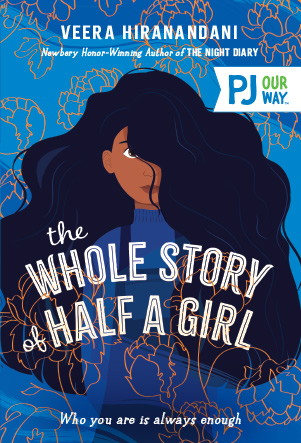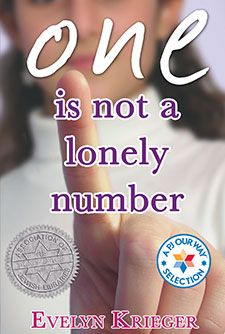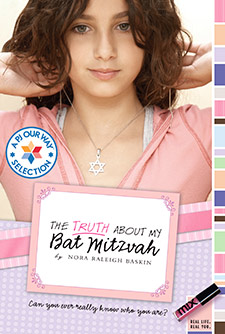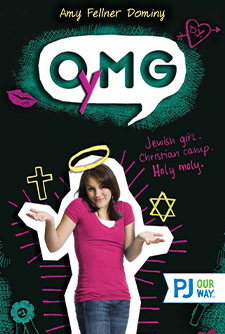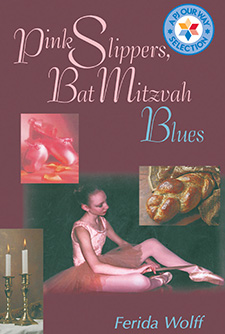The Whole Story of Half a Girl
"I am half Indian, half Jewish, and now I’m half a cheerleader!" When Sonia’s father loses his job, she must leave her beloved private community school and attend the local public school. Will she ever feel like she belongs?
Average Rating
( hint: Login to leave a review! )
135 Reviews
Leave Review
What the Book Is About
Jewish Content & Values
Positive Role Models
Content Advisory
Talk It Over
More for You
What the Book Is About
Sixth grader Sonia Nadhamuni is half-Jewish and half-South Asian. When her father loses his job, she is forced to switch from a private, alternative school that she loves to the local public school. Sonia struggles to understand herself and her Jewish identity, particularly with regard to her relationships with Alisha (an African American aspiring writer) and Kate (a popular cheerleader).
Jewish Content & Values
- Sonia’s mom is Jewish and her dad is South Asian. As Sonia questions her Jewish identity, her grandmother takes her questions seriously and lets Sonia know that she is Jewish, even if she doesn’t always feel she is.
- Sonia’s mom has a strong connection to Israel; unsure if she should marry Sonia’s dad, she traveled to Israel to find the peace of mind to make her decision. Sonia also has good memories of a family trip to Israel.
- Sonia mentions celebrating Hanukkah and Passover.
- Sonia’s grandparents help out while her father is missing. They keep kosher and practice a more traditional Judaism.
Positive Role Models
- Sonia’s mom makes sure that her family communicates honestly even when there are a lot of unknowns. She says to Sonia, “You should be able to ask questions and talk to me about anything."
- Alisha is Sonia’s new friend who she meets at public school. Alisha cares more about what is on the inside than the outside.
- Sonia’s grandma is someone Sonia can speak to about being Jewish. She stresses that Sonia is fully Jewish, but gives her the space to decide how to incorporate her Jewish identity into her life.
- Mrs. Langley is Sonia’s English teacher. She appreciates Sonia’s potential and understands what she is going through. She’s a great example of a supportive and encouraging educator.
Content Advisory
While this book has no physical violence, it does explore a number of complex subjects in a way that is accessible to a young reader. For example, in the final chapters of the book, Sonia’s dad goes missing. When he is found, he is admitted to a hospital for treatment, and there is honest and compassionate dialogue about depression and the steps he is taking to get better. Sonia plays Spin the Bottle at a party and is pressured into kissing a boy she does not like. After the party, she confides in her mom, who gives her solid advice: “You don’t ever have to kiss anyone unless you want to.” Sonia struggles with what it means to be Jewish. She goes to church once with her Christian friend, Kate, and even tells Kate’s family that she is not Jewish. Eventually, she is able to discuss this with her mom. Finally, struggling to fit in, Sonia lies to her mom about the cost of a pair of shoes she receives as a gift from her friend’s mom.
Ultimately, what makes this book appropriate for young people is that Sonia and her mother, teacher, and good friends discuss each deep theme openly and honestly. Although there are few easy answers, the questions are addressed thoughtfully, and with care and nuance.
Ultimately, what makes this book appropriate for young people is that Sonia and her mother, teacher, and good friends discuss each deep theme openly and honestly. Although there are few easy answers, the questions are addressed thoughtfully, and with care and nuance.
Talk It Over
Sonia says to her dad, “Sometimes it feels like I’m the only one like me.” Have you ever felt that way? How does it make you feel? What is unique and special about you?
More for You
Sonia has many questions, and the fact that she asks them in order to understand herself and her world fits in perfectly with Jewish tradition. On the Passover holiday, the Four Questions are traditionally asked by the youngest child in the family, inspiring the retelling of the story of the Jewish exodus from ancient Egypt. At any age, Jewish tradition welcomes questions and the opportunity for the growth that they provide.
What the Book Is About
What the Book Is About
Sixth grader Sonia Nadhamuni is half-Jewish and half-South Asian. When her father loses his job, she is forced to switch from a private, alternative school that she loves to the local public school. Sonia struggles to understand herself and her Jewish identity, particularly with regard to her relationships with Alisha (an African American aspiring writer) and Kate (a popular cheerleader).
Jewish Content & Values
Jewish Content & Values
- Sonia’s mom is Jewish and her dad is South Asian. As Sonia questions her Jewish identity, her grandmother takes her questions seriously and lets Sonia know that she is Jewish, even if she doesn’t always feel she is.
- Sonia’s mom has a strong connection to Israel; unsure if she should marry Sonia’s dad, she traveled to Israel to find the peace of mind to make her decision. Sonia also has good memories of a family trip to Israel.
- Sonia mentions celebrating Hanukkah and Passover.
- Sonia’s grandparents help out while her father is missing. They keep kosher and practice a more traditional Judaism.
Positive Role Models
Positive Role Models
- Sonia’s mom makes sure that her family communicates honestly even when there are a lot of unknowns. She says to Sonia, “You should be able to ask questions and talk to me about anything."
- Alisha is Sonia’s new friend who she meets at public school. Alisha cares more about what is on the inside than the outside.
- Sonia’s grandma is someone Sonia can speak to about being Jewish. She stresses that Sonia is fully Jewish, but gives her the space to decide how to incorporate her Jewish identity into her life.
- Mrs. Langley is Sonia’s English teacher. She appreciates Sonia’s potential and understands what she is going through. She’s a great example of a supportive and encouraging educator.
Content Advisory
Content Advisory
While this book has no physical violence, it does explore a number of complex subjects in a way that is accessible to a young reader. For example, in the final chapters of the book, Sonia’s dad goes missing. When he is found, he is admitted to a hospital for treatment, and there is honest and compassionate dialogue about depression and the steps he is taking to get better. Sonia plays Spin the Bottle at a party and is pressured into kissing a boy she does not like. After the party, she confides in her mom, who gives her solid advice: “You don’t ever have to kiss anyone unless you want to.” Sonia struggles with what it means to be Jewish. She goes to church once with her Christian friend, Kate, and even tells Kate’s family that she is not Jewish. Eventually, she is able to discuss this with her mom. Finally, struggling to fit in, Sonia lies to her mom about the cost of a pair of shoes she receives as a gift from her friend’s mom.
Ultimately, what makes this book appropriate for young people is that Sonia and her mother, teacher, and good friends discuss each deep theme openly and honestly. Although there are few easy answers, the questions are addressed thoughtfully, and with care and nuance.
Ultimately, what makes this book appropriate for young people is that Sonia and her mother, teacher, and good friends discuss each deep theme openly and honestly. Although there are few easy answers, the questions are addressed thoughtfully, and with care and nuance.
Talk It Over
Talk It Over
Sonia says to her dad, “Sometimes it feels like I’m the only one like me.” Have you ever felt that way? How does it make you feel? What is unique and special about you?
More for You
More for You
Sonia has many questions, and the fact that she asks them in order to understand herself and her world fits in perfectly with Jewish tradition. On the Passover holiday, the Four Questions are traditionally asked by the youngest child in the family, inspiring the retelling of the story of the Jewish exodus from ancient Egypt. At any age, Jewish tradition welcomes questions and the opportunity for the growth that they provide.

